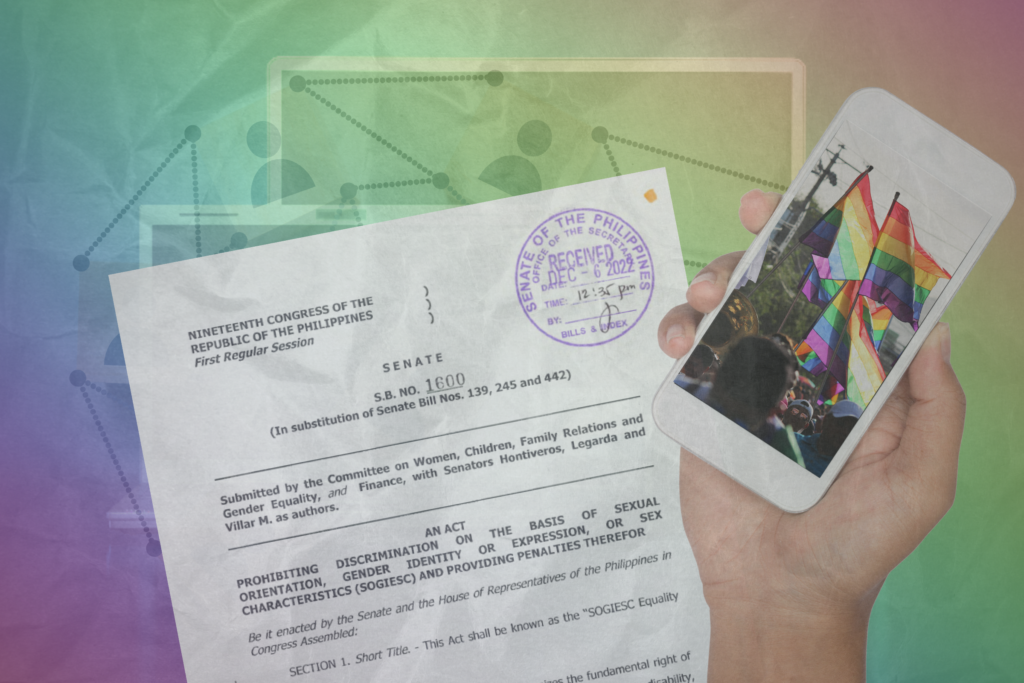Rappler highlights online communities’ role in connecting LGBT Filipinos pushing for SOGIE Bill

CHEERS TO Rappler for its in-depth report highlighting the personal and collective struggles of the Filipino LGBT community. Through interviews, research, and visualized data, it showed how social media have become an essential tool for marginalized communities to assert their rights.
Don Kevin Hapal’s February 11 story focused on the online communities mobilized by LGBT Filipinos. It is the first of two parts.
Personal, social, political issues
The report led with the experience of Mikee, a closeted Filipino gay man living a “two-pronged” life: on the surface, a subdued life of quiet conformity and online, a secret life in the “gay Twitter” community. Hapal identified the online circle as just one of many social media communities where people like Mikee can connect with like-minded LGBT Filipinos who seek the same safe space to be their authentic selves.
The online communities were described as venues for socializing without fear of discrimination. But aside from lighthearted memes and pop culture, these online spaces also play an important role in organizing and enabling social action.
Hapal’s report recalled some instances when these communities defended democratic values and human rights at the height of the COVID-19 pandemic, such as their online protests against the ABS-CBN shutdown by the administration of former president Rodrigo Duterte, which many “LGBT-focused” users were quick to join, and the online “#OustDuterte” campaign, which they reportedly initiated.
Research shows limits to LGBT “acceptance”
Rappler also interviewed Reyna Valmores, Chairperson of Bahaghari, an LGBT rights advocacy group. Valmores described online communities as “effective” in bringing together LGBT Filipinos who face “isolation” and “exclusion” from an unaccepting society.
Hapal presented research findings that reflected the “complicated relationship between the LGBT community and the predominantly Catholic country.” A graph drawn from a Pew Research Center report in 2019 and key figures from the results of Social Weather Stations (SWS) surveys in 2018 and 2019 paint a picture of limited acceptance.
Respondents “accept” LGBT Filipinos and are aware of the discrimination the LGBT community faces. But this acceptance and awareness do not translate into wanting equal rights for LGBT Filipinos, with 45 percent of respondents not in favor of passing measures like the SOGIESC (Sexual Orientation, Gender Identity, Gender Expression, and Sex Characteristics) Equality Bill, which seeks to protect the LGBT community from discrimination.
23 years of pushing the SOGIE Bill
Hapal traced the long history of the SOGIE Bill from when it was first introduced by lawmakers in 2000, making it the “longest-running bill to be under Senate interpellation in the Philippines.” The bill has been re-filed in every Congress since then, but was opposed and eventually rejected by lawmakers each time.
The current iteration of the bill, now known as the SOGIESC Equality Bill, “proposes the prohibition of discriminatory acts if made on the basis of SOGIESC, including the denial of access to health and public services, refusing admission or expulsion in schools on the basis of SOGIESC, and revoking the accreditation of organizations based on the SOGIESC of members.”
Valmores identified two main barriers to the bill becoming law: basic awareness of what SOGIE is and “politicians who… have made it their life’s work to stop any legislation for the LGBT community.” She added that based on Bahaghari’s experience working with communities on the ground, even the average gay Filipino is unaware of what SOGIE is.
But rather than be discouraged, Valmores said that the LGBT community has taken this as a challenge to intensify efforts both online and offline in raising awareness on SOGIE basics and campaigning for the SOGIE Bill.
Hapal also recalled that when the SOGIESC Equality Bill was taken up in both the House and the Senate just recently, it was again blocked by politicians. The report noted that the legislature is “held captive by the religious vote,” as the politicians in opposition of the bill have always cited Catholicism as the reason for their rejection of the bill.
The SOGIESC Equality Bill is at a crucial stage. Media should be aware not only of the need for increased coverage, but more importantly of the need to elevate the discourse. Media’s focus on the repetitive arguments of anti-SOGIE Bill politicians reinforces the idea that “official” views take precedence over the rights and welfare of the marginalized. Journalists should seek the side of the LGBT community whose voices are drowned out by lawmakers who treat their basic rights as subjects for debate.
Leave a Reply